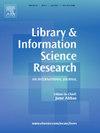Examining nonsuicidal self-injury content creation on TikTok through qualitative content analysis
Abstract
Qualitative content analysis is a methodological approach for the subjective interpretation of data. Using empirical research to illustrate the methodological advantages and disadvantages of qualitative content analysis, this article examines the suitability of qualitative content analysis for the field of LIS and illustrates how the method can be used to inform LIS information practices research of marginalized populations through emerging information and communication technologies (ICTs). Specifically, this article examines the suitability of qualitative content analysis through its application in an ongoing study exploring how individuals who engage in nonsuicidal self-injury circumnavigate algorithmic exclusion in the emerging ICT TikTok. Qualitative content analysis can advance LIS research and practice by refuting deficit thinking and understanding information creation practices in context. Methodological shortcomings relate to the reduction of data and the inability to determine cause-and-effect relationships. The author recommends that researchers supplement qualitative content analysis with additional qualitative approaches to address these limitations.

 求助内容:
求助内容: 应助结果提醒方式:
应助结果提醒方式:


